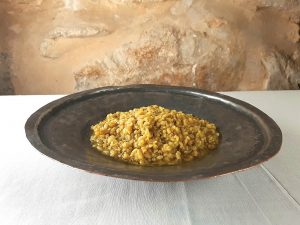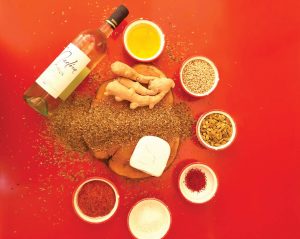By Fadi Kattan
A chef strives not only to create tasty, innovative dishes but also bears tremendous responsibility in the choice of products, the environmental impact, the decision to make certain preparations in the kitchen to limit food waste, and lastly, to manage the food waste that is produced.
On the choice of ingredients, I am not a fan of integrating produce that has come from the other end of the world, often impacting our environment in terms of CO2 emissions from transport and denying populations their basic foods as we make them into fashionable ingredients, as is the case with quinoa.
For the broth, vegetable and herb scraps and peelings accumulate in our kitchens every day. At home, the quantities are small, but imagine in a professional kitchen! Don’t throw them away. You can make the vegetable and herb broth and freeze it for later use if the quantities are too much for what you are cooking on the day.
Freekeh is a Palestinian super grain, delicious, local, and sustainable. This freekeh risotto adapts the Milanese preparation to our local super grain for a hearty meal or a creamy side dish.
Ingredients for the vegetable broth
– Vegetable scraps and herbs (thyme, oregano, carrot tops and ends, onion tops, parsley stems, za’atar leaves, tomato cores, celery bits)
– WaterPut all the vegetables and herbs in a pot, cover with water, and boil for 45 minutes. Then strain the broth and reserve the quantity needed. The rest can go into pots in the fridge or freezer.
Ingredients for the freekeh risotto
6 cups vegetable and herb broth
A few leaves of sage
1 tablespoon saffron threads
3 tablespoons olive oil
2 small yellow onions, minced
A pinch of ground cardamom
A pinch ground ginger
2 cups freekeh (rinsed)
1 cup Taybeh Sauvignon Blanc (or another good-quality, crisp, high-acidity white wine)
½ cup baladi cheese
1 tablespoon olive oilCoarse Dead Sea salt and freshly ground white pepper
1. Put the vegetable broth, the sage leaves, and the crushed saffron threads in a pot on medium heat.
2. In a large pot, heat the olive oil and then the onions. Cook until soft. Add the cardamom and ginger.
3. Add the freekeh. NB: You need to rinse the freekeh beforehand and remove the small stones.
4. Stir the freekeh in the olive oil and onion mixture for 3 to 4 minutes.
5. Add the Sauvignon Blanc wine. Cook until the wine has evaporated.
6. Add ½ cup warm broth. Cook while stirring until absorbed.
7. Continue adding ½ cup broth at a time and stirring until evaporated.
8. When the freekeh is cooked and creamy, remove from the heat, stir in the olive oil, baladi cheese, and salt and pepper to taste.



